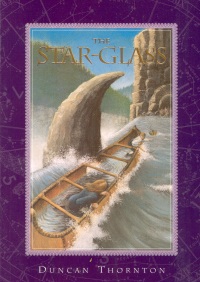| ________________
CM . . .
. Volume XI Number 2 . . . . September 17, 2004
excerpt:
Duncan Thornton's third fantasy, The Star-Glass, reads like a nineteenth-century adventure story with a few spells and monsters thrown in to add a sense of magic. Readers aged ten to fourteen who enjoy Tolkien will certainly enjoy this book. It's structured as a classic quest, with Tom and Jenny returning at the forefront to enjoy more harrowing adventures. The action begins when a tempest comes to Landsend and acts as yet another warning sign of the Long Night to come. Thus, the Captain of the Volantix is persuaded to begin the search for The Homely Country which will allow the people of Landsend to escape the pestilence and death the Long Night will surely bring. He summons Jenny, Tom, and Gimlet to come to the Volantix and join the journey. Then follows a long, dangerous, adventure-filled expedition from the Ocean Sea, through the Beaver Fens, over Lshca Lunrach, along the River Roaring, towards the eventual coveted destination of The Homely Country. They are successful in their quest, but not before death claims some of their party. The Star-Glass is a very Canadian kind of fantasy, complete with wild Northern animals (usually re-named as monsters and sometimes granted magical powers), First Nations guides, and exploration by canoe and portaging. In fact, The Star-Glass seems more like a history of European emigration and exploration of Canada that has been thinly disguised with magic and heavily embellished with adventure than a vividly realized secondary world. Perhaps this was Thornton's goal; however, the novel seems to rest uneasily on the border between genres, never truly delivering the satisfaction of either. This situation is partly due to the fact that a journalistic distance is maintained throughout The Star-Glass. We are always told what happens, never shown. Characters are never fully fleshed out or developed into living, breathing beings. Further, we must walk behind the characters, instead of being invited to see and feel events alongside them. Readers who enjoy this kind of narrative distance in other successful adventures, such as The Golden Pinecone, Swallows and Amazons, and The Lord of the Rings, won't be at all bothered and will simply enjoy the 400 pages of challenges, danger, and narrow escapes. Those who demand to truly get inside the head of a character and participate in what s/he experiences will be disappointed. These are issues of personal taste, though. Judging from the textual elements of The Star-Glass, such as the detailed chapter headings, list of illustrations, lofty, old-fashioned diction, as well as the aforementioned flat characters and plot-driven narrative, it would seem that Thornton did, indeed, set out to write a book very much in the style of a nineteenth-century adventure story. In this he has succeeded admirably. If you know children who enjoy this kind of book, point them in the direction of Duncan Thornton's latest offering. Recommended. Michelle Warry is a graduate student in UBC's Master of Arts in Children's Literature program.
To comment
on this title or this review, send mail to cm@umanitoba.ca.
Copyright © the Manitoba Library Association. Reproduction for personal
use is permitted only if this copyright notice is maintained. Any
other reproduction is prohibited without permission.
NEXT REVIEW |TABLE OF CONTENTS FOR THIS ISSUE
- September 17, 2004.
AUTHORS
| TITLES | MEDIA REVIEWS
| PROFILES
| BACK ISSUES
| SEARCH | CMARCHIVE
| HOME |
